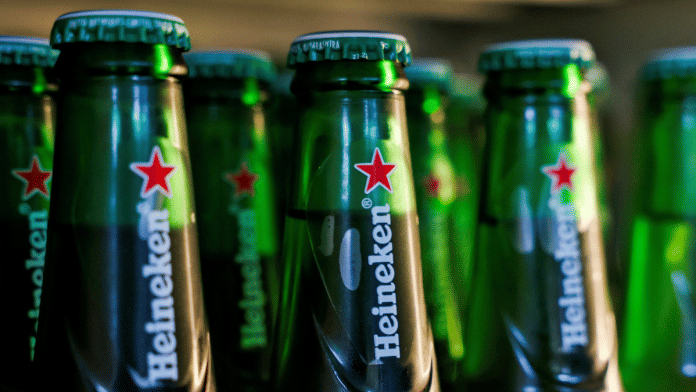Bengaluru: Nearly 70 percent of what consumers pay for beers in Telangana are state taxes. The Revant Reddy government’s decision not to revise basic prices, rising inflationary costs and lower returns are some of the reasons cited by United Breweries (UB) to justify stalling sale of its products to one of its biggest markets in the country.
“We would like to highlight that nearly 70% of the consumer price for beer brands consists of Telangana State taxes, including duties, VAT, and other levies, while our current basic price, which encompasses the cost of manufacturing and supplies to TGBCL (Telangana Beverages Corporation Limited), accounts for only ~16%,” UB said in a statement Thursday.
Company sources say that nearly 20 percent of UB’s sales come from Telangana, making it one of its top markets and the decision to stop sales to the state would likely dent its topline growth.
But more importantly, the bigger impact of this decision is likely to be felt by the state whose reliance on excise revenues for much-needed funds for bankrolling its welfare and infrastructure needs could not be higher in the post-GST regime.
The Telangana government expects to rake in about Rs 25,617.53 crore this fiscal in excise duties. Though beer accounts for a smaller share of this estimate, the UB decision is likely to open the flood gates of other alcoholic beverage makers to demand similar revisions. In March last year, ThePrint has previously reported on the alcohol industry’s demands for inflation-linked pricing models from state governments.
A Reuters report on Thursday stated that Diageo, Pernod Ricard, and Carlsberg have pressed Telangana state for unpaid dues amounting to $466 million (about Rs 4,060 crore), intensifying the standoff between alcohol-beverage giants and state governments who enjoy sole powers on excise-related duties. The TGBCL owes Rs 658.95 crore to UB for past supplies.
The Indian beer market size is estimated to rise to around over Rs 62,000 crore by 2028 from around Rs 38,000 crore in 2024, according to IMARC Group. With states enjoying sole powers on excise-related duties, the standoff is likely to cost the state more than the company.
Also Read: India’s start-up funding winter continues, with current quarter seeing lowest investments in 3 yrs
‘Legacy dues’
State excise makes up for 19 percent of Telangana’s revenues, according to an analysis by independent research institute PRS Legislative. According to UB, Telangana’s annual beer market is approximately 5.8 to 6 crore cases and the state is classified as “one of the key and largest markets for UBL”. One case of beer contains 24 bottles or cans (12 when it is 650 ml).
But the state government has accused UB of trying to misuse its dominant position to demand revision of basic prices in Telangana. “We are having discussions, and I am hopeful that the issue would be resolved soon,” a senior Telangana government official said.
Even the money owed to alco-bev companies are ‘legacy dues’ that have piled up over the years and it is being paid off periodically, the official added.
In a press conference Wednesday, Rao said that prices of beer in Telangana were lower when compared to other southern states, including Karnataka.
“If the prices of Kingfisher beers are increased by 33 percent as requested by United Breweries, it will put a heavy burden on alcohol lovers. We have formed a committee with a retired high court judge on this price hike. We will take a decision on the price hike after the report of that committee is received,” the excise minister said in a post on ‘X’.
He added that UB has held a monopoly in the beer market with nearly 70 percent and that pending bills was what the Congress inherited from its predecessor, the K.Chandrashekar Rao-led Bharat Rashtra Samithi (BRS).
“The company denies the allegations that the bills are not being received from the government. The bills were pending even when we came to power. After our government came to power, we paid pending bills of Rs 1,139 crore,” Rao said.
UB, in its statement, said that inflation costs have piled up, making it harder to operate with current prices.
Barley, the primary ingredient in beer making, saw a 27 percent inflationary increase over the last three years, it said. Similarly, sugar was up 13 percent, 110 percent inflation in fuel, 32 percent in electricity, and 33 percent in glass bottles.
“Although inflation data reflect increases in the cost of new glass bottles, the actual cost rise is also influenced by the ratio of new bottles to reused bottles. Given the significant growth of the Telangana market over the past three years and our current full-capacity operations, we are infusing a much higher percentage of new bottles into the market and would be required to do so as the market expands. Consequently, the actual cost increase in glass bottles is greater than the average inflation rate,” the Bengaluru-headquartered company said.
The picture is similar in the overall liquor market as well with the Confederation of Indian Alcoholic Beverage Companies (CIABC), writing to some state governments to allow free pricing.
Analysts say that price increase happens once in three-four years but inflationary costs tend to weigh on bottom line growth for companies, making it unviable to continue producing with lower returns.
“Alco-bev contributes roughly 25 percent to a state’s GDP. So it’s a golden goose. So the state believes…very often we have conversations like won’t increase prices because volumes will fall, leading to a fall in collections (sic). Whereas the alcoholic beverages industry is like any other. Volumes will go up and down and, finally, like water will find its own level,” International Spirits and Wines Association of India (ISWAI) CEO Nita Kapoor had earlier told ThePrint.
(Edited by Tony Rai)






